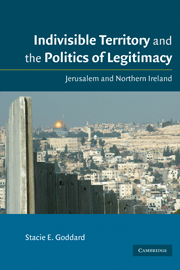8 - Conclusion
Published online by Cambridge University Press: 26 January 2010
Summary
The central question of this book is how it is territory becomes indivisible: why, under some conditions, are actors unable to divide territory through partition, compensation, shared sovereignty, and other mechanisms of division? I have argued that far from being an inherent characteristic of territory, indivisibility is a political construct. Territory, ideally, is divisible, but claims to Jerusalem, Ulster, Kashmir, and Kosovo appear irreconcilable both to observers and antagonists. The puzzle of this book is thus one of construction: how do actors come to represent territory in ways that its indivisibility becomes a social fact?
Whether territory becomes indivisible depends on how actors legitimate their claims to territory. I defined legitimation strategies as rhetoric that employs public and recognized reasons to justify claims to an issue. The legitimation process described here is strategic: actors choose legitimation strategies designed to advance their own political interests. Legitimation strategies can build support at home; by making legitimate claims, politicians hope to secure domestic support for their position. Politicians also use legitimation strategies for rhetorical coercion; they will use rhetoric that their opponent must accept as legitimate, or else risk undercutting their own position. It is difficult, for example, for a U.S. politician to stand against the support of a democratic ally, such as Georgia, even if that ally might be at fault. To do so would seem to undermine the edict that liberal democracies must support each other. Politicians also use legitimation strategies to feign inflexibility at the bargaining table.
- Type
- Chapter
- Information
- Indivisible Territory and the Politics of LegitimacyJerusalem and Northern Ireland, pp. 240 - 256Publisher: Cambridge University PressPrint publication year: 2009



